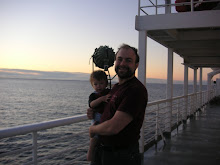It's Thursday afternoon and I'm in my office looking at partly cloudy sky over the Willamette River. It seems that Spring has sprung here in the rose city. I saw a tree in bloom two days ago and there are crocuses popping up out of the ground. Winter is trying to hang on; last night there was a little snow. But the world is definitely tilting towards spring.
Today, Tom and I had our weekly meeting and he showed me how to run some useful statistical tests in SPSS. So this afternoon, I started exploring the data set from his school-based study to see what I might find. I started out by making a grid of all the possible predictor variables that we have in the data and possible outcome variables. I'm looking at the child and mentor characteristics to see what might predict different relationship quality outcomes. So I'm running some correlations and t-tests on the different variables. I probably ran twenty different predictor variables today and looked at a set of five outcome variables. So far I've only found a few statistically significant results.
I'm very new at all this but the best simile I can come up with right now is panning for gold. It feels like I'm sifting through all the finds of data to find the few nuggets of statistically significant relationships. It's kind of fun because you just don't know what you might find. But it also seems a bit tedious. I can see how you would want to be methodical, to keep track of where you are in the wilderness of data at any point in time.
I'm also working on preparing for some phone interviews for the follow-up research to the Summer Institute on Youth Mentoring. We want to get some more in-depth data from participants, so I am creating a phone interview guide and figuring out the logistics to doing the interviews. I've randomly selected five participants from both years. Now I need to work with Tom to make sure we have compliance with the IRB to do the additional interviews. If you aren't familiar with IRBs, they are basically bodies affiliated with research institutions that make sure we are treating human subjects properly. I also need to figure out how I will be able to record the interviews digitally for later transcription.
One of the things I've learned so far is how long things take in a research setting. There are a lot of hidden steps (like getting IRB approval) that you wouldn't know about unless you were forced to do them. It's taken a bit of getting used to, since I am naturally a little manic and impatient. But it's probably good for me to slow down and learn a little patience. It's also probably good for me to learn to think more methodically. Since you're forced to slow down, it makes sense to think through all the future steps up front. Otherwise, you might get far into your study and realize you should have done something differently. But once you are down the path, it's hard to turn back without wasting a lot of time and resources.
This week, I was interested to learn about two separate research papers. One that I would highly recommend reading is a new Policy Brief on youth mentoring. It was written by Tim Cavell, David DuBois, Michael Karcher, Tom Keller, and Jean Rhodes. It outlines a lot of what we know from a research perspective about youth mentoring, it's promise for America's youth, and its limitations. I hope this paper can influence the new administration to invest more in youth mentoring. President Obama seems to be highly interested in research to back up the expenditure of federal resources. It would also be wonderful to see President Obama to personally appeal to men of color to become involved as mentors. He seems uniquely poised to encourage more African American men to mentor youth.
Unfortunately, relying on research to guide our federal expenditures can be a risky proposition. The recent evaluation of school-based mentoring by the US Department of Education is a good example. I'm looking forward to reading it, but I understand that the report has fairly week findings on the impacts from school-based mentoring. This contrasts with the recent study of Big Brothers Big Sisters school-based mentoring, which found a wide range of impacts in the first year of the study. I hope that the new administration doesn't jump to the simple conclusion that school-based mentoring doesn't work based on this one evaluation.
Reading research with a keen and critical eye is something I'm still learning how to do. It sure seems to take a while to gain the necessary knowledge to do so. It makes you wonder how well research is digested in this complicated world of ours. My thought right now is that most research probably gets misinterpreted and misread most of the time. But I'm still learning!
Subscribe to:
Post Comments (Atom)

No comments:
Post a Comment